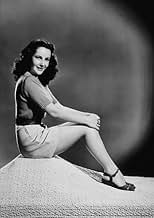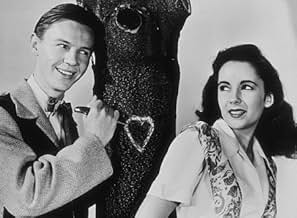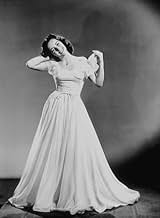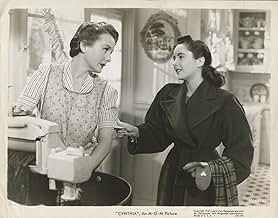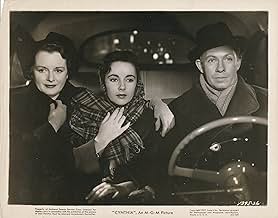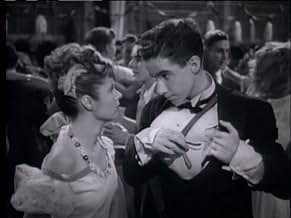Aggiungi una trama nella tua linguaSickly girl finds an outlet in music.Sickly girl finds an outlet in music.Sickly girl finds an outlet in music.
- Regia
- Sceneggiatura
- Star
- Premi
- 1 vittoria in totale
Carol Brannon
- Fredonia Jannings
- (as Carol Brannan)
Erville Alderson
- Dingle Clerk
- (non citato nei titoli originali)
Charles Bradstreet
- Stubby Stubblefield
- (non citato nei titoli originali)
Recensioni in evidenza
If the one-sentence synopsis, "A sickly teenager wishes more than anything to be allowed to perform in the school play," doesn't grab you, don't pay it any attention. Watch Cynthia anyway. It's a delightful gem from Elizabeth Taylor's younger days, even earlier than Little Women! And speaking of Little Women, Mary Astor plays Liz's mother in this film as well. George Murphy plays her father, and S.Z. Sakall rounds out the cast as the school's lovable theater director.
At the start of the film, Mary and George are shown young and in love, and their adorable romance quickly blossoms into marriage. They have grand plans to live in Vienna and study music and medicine, but when Mary gets pregnant, their plans go on hold temporarily. Fifteen years later, they're stuck in the same small town, renting a house they can't afford, struggling to pay their daughter's outrageous doctor's bills on a one-income salary from George's work in a hardware store. The parents' part of the film is actually quite sad, as you feel their disappointment as well as their guilt whenever they resent their lost dreams. Both George and Mary give wonderful performances.
Because George and Mary are so three-dimensional, it's difficult to call Liz the gem of the film, but she really is. She's so delightful, innocent, charming, passionate, and frail, culminating in such a captivating performance it's absolutely impossible not to love her. And since it's so impossible not to love her, you understand why George bows and scrapes to his boss as well as his brother-in-law, the greedy Gene Lockhart who treats Liz during her countless illnesses. You understand every part of Mary's behavior, as she embodies every mother's journey in raising a teenaged daughter. In one scene, Liz comes home from her first date. Mary wants to revel in her daughter's happiness, but she also tries to instill responsibility, like taking better care of her dress or soaking in a hot bath so she won't catch cold.
Every part of this movie is a joy to watch, from the cute to the tragic. You'll reach for your handkerchief from time to time, and if you watch this with your kids or parents, you'll cry even more. Everyone gives strong performances, and I'm sure you'll find your favorite moments as I have. At the heart of it all is Elizabeth Taylor, so beautiful and yet so innocent and fresh, even though it's impossible she ever felt what her character went through in real life. How could the gorgeous Elizabeth Taylor know what it felt like to be ignored by all the boys in school, and then the thrilling joy at being allowed to go to her first dance? It's called acting, and she does it beautifully.
At the start of the film, Mary and George are shown young and in love, and their adorable romance quickly blossoms into marriage. They have grand plans to live in Vienna and study music and medicine, but when Mary gets pregnant, their plans go on hold temporarily. Fifteen years later, they're stuck in the same small town, renting a house they can't afford, struggling to pay their daughter's outrageous doctor's bills on a one-income salary from George's work in a hardware store. The parents' part of the film is actually quite sad, as you feel their disappointment as well as their guilt whenever they resent their lost dreams. Both George and Mary give wonderful performances.
Because George and Mary are so three-dimensional, it's difficult to call Liz the gem of the film, but she really is. She's so delightful, innocent, charming, passionate, and frail, culminating in such a captivating performance it's absolutely impossible not to love her. And since it's so impossible not to love her, you understand why George bows and scrapes to his boss as well as his brother-in-law, the greedy Gene Lockhart who treats Liz during her countless illnesses. You understand every part of Mary's behavior, as she embodies every mother's journey in raising a teenaged daughter. In one scene, Liz comes home from her first date. Mary wants to revel in her daughter's happiness, but she also tries to instill responsibility, like taking better care of her dress or soaking in a hot bath so she won't catch cold.
Every part of this movie is a joy to watch, from the cute to the tragic. You'll reach for your handkerchief from time to time, and if you watch this with your kids or parents, you'll cry even more. Everyone gives strong performances, and I'm sure you'll find your favorite moments as I have. At the heart of it all is Elizabeth Taylor, so beautiful and yet so innocent and fresh, even though it's impossible she ever felt what her character went through in real life. How could the gorgeous Elizabeth Taylor know what it felt like to be ignored by all the boys in school, and then the thrilling joy at being allowed to go to her first dance? It's called acting, and she does it beautifully.
All of the reviews seem to be about Elizabeth Taylor, but very little mention about George Murphy and Mary Astor. Murphy almost sleepwalks his way through the film. Sixteen years as a clerk in a hardware store without a raise? Really? Where's the gumption, the backbone in the character. Is Napoleon so small a town that he can't find a better job somewhere else? A better actor would have shown some bitterness as being denied the opportunity to become a doctor. Mary Astor was going to be a concert pianist. Surely these failures of ambition can't simply be blamed on the sickly child that was born to them.
At first it turned me off, some, because it is so innocent and golly-gee-willickers. Father is manager at Dingle's hardware store. As it turns out it's so sweet and cute it's irresistible. Boasts a refreshing sense of humor, family sensitivity, excellent characters and acting. The contrast in attitudes between mother and father works really well. What a marvelous mother-daughter relationship. The acting is tops: Taylor, of course, parents, the schoolboys and Elizabeth's cousin; and my favorite, the music teacher. This movie will make you feel.
I came into this film on TCM at 6:15 AM one morning, about 1/4 into it so I missed the opening and establishing of the players backgrounds and motivations, and I did not 'get them' until the denouement. The motivations of the mother and father as well as the uncle as the doctor and his family, are the engine that drive the plot. However, the directors job, once he has a decent story, is to elicit emotion of varying kinds from the audience. If you want to look at and watch Liz Taylor in all her youthful glory and magnetism, this is one of the best. Ironically if forebodes her complete life as a great actress who has health problems all her life. This film took me up and down several times much to my amazement and has a great Hollywood, happy wrap up. (nothing wrong with feeling good especially at 6 A M). Yes, of course there are some problems but I watch films for the way they make me feel in the end, not specifically to be a critic, especially films of this genre and contrived time period. I loved it because it made me feel alive and real!!We all have felt these same emotions in our youth and this well done film allows us feel these once more.
At the height of her film career Elizabeth Taylor was one of the most famous women in the world, and even after she retired from acting she remained famous, largely because of her notoriously complex love-life. And yet there are a surprisingly large number of films on her CV which today are virtually forgotten and which even when first released probably did not arouse a great deal of interest. "Cynthia", dating from 1947 when Taylor was only fifteen, is a case in point.
Cynthia Bishop is a beautiful teenage high school girl from the small town of Napoleon, Illinois. Most of the plot revolves around the point that Cynthia is supposedly physically frail and suffers from health problems and is therefore not allowed to do many of the things that teenage girls normally do, such as attending the school prom. There is also a sub-plot dealing with the frustrated dreams of her parents Larry and Louise, both of whom once dreamed of going to Vienna, Larry to study medicine and Louise to study music. They never, however, realised these ambitions, and today Larry is a badly-paid assistant in a hardware store and Louise a housewife.
The film was based on a play called "The Rich, Full Life", and although I have never seen it- indeed, I had never previously heard of it or of its author, one Viña Delmar- that title seems to sum up the general theme. The idea is that one can still live a rich, full life even if one is an invalid or if one's youthful ambitions have been thwarted. The screenplay, however, does not fully realise the potential of either of the two plotlines, and too much is left unclear. We are never told exactly why Louise and Larry were unable to study in Vienna; the implication is that Louise accidentally became pregnant out of wedlock and that theirs was a shotgun marriage, but in the moral climate of the forties, with the Production Code still in full force, this could not be made explicit. (There is no acknowledgement of the fact that the Vienna of the 1930s, torn by political strife between Nazis, Communists, Socialists and Austro-fascists, might not have been the most congenial place in which to study, nor of the fact that there are perfectly good medical schools and colleges of music in America itself; the "Vienna" of this film is simply a romantic symbol of youthful illusions, not a real-life city).
Cynthia is the title character, and most of the action revolves around her, but the healthy-looking Taylor never makes a convincing invalid. It is never made clear exactly what illnesses Cynthia suffers from, beyond the fact that she tends to catch cold easily- Taylor spends a lot of the film sneezing- or whether her status as an invalid is genuine. It is strongly hinted that she may in fact be the victim of obsessive concern on the part of her over-protective parents, backed up by the local doctor (who also happens to be Cynthia's uncle)- what one might call hypochondria by proxy.
The film-makers never seem quite clear whether they are making a comedy or a serious family drama. The overall theme is a basically serious one, but in many parts, especially those scenes dealing with the rivalry between Cynthia and her insufferable cousin Fredonia, they are obviously aiming for laughs. (Whether they actually achieve them is another matter). Taylor displays both the beauty and the charisma which were later to make her a big adult star, but not unfortunately the talent, and there are no performances of any particular merit from anyone else in the cast. It is not difficult to understand why "Cynthia" is today one of the most obscure entries in Taylor's filmography. 4/10
Cynthia Bishop is a beautiful teenage high school girl from the small town of Napoleon, Illinois. Most of the plot revolves around the point that Cynthia is supposedly physically frail and suffers from health problems and is therefore not allowed to do many of the things that teenage girls normally do, such as attending the school prom. There is also a sub-plot dealing with the frustrated dreams of her parents Larry and Louise, both of whom once dreamed of going to Vienna, Larry to study medicine and Louise to study music. They never, however, realised these ambitions, and today Larry is a badly-paid assistant in a hardware store and Louise a housewife.
The film was based on a play called "The Rich, Full Life", and although I have never seen it- indeed, I had never previously heard of it or of its author, one Viña Delmar- that title seems to sum up the general theme. The idea is that one can still live a rich, full life even if one is an invalid or if one's youthful ambitions have been thwarted. The screenplay, however, does not fully realise the potential of either of the two plotlines, and too much is left unclear. We are never told exactly why Louise and Larry were unable to study in Vienna; the implication is that Louise accidentally became pregnant out of wedlock and that theirs was a shotgun marriage, but in the moral climate of the forties, with the Production Code still in full force, this could not be made explicit. (There is no acknowledgement of the fact that the Vienna of the 1930s, torn by political strife between Nazis, Communists, Socialists and Austro-fascists, might not have been the most congenial place in which to study, nor of the fact that there are perfectly good medical schools and colleges of music in America itself; the "Vienna" of this film is simply a romantic symbol of youthful illusions, not a real-life city).
Cynthia is the title character, and most of the action revolves around her, but the healthy-looking Taylor never makes a convincing invalid. It is never made clear exactly what illnesses Cynthia suffers from, beyond the fact that she tends to catch cold easily- Taylor spends a lot of the film sneezing- or whether her status as an invalid is genuine. It is strongly hinted that she may in fact be the victim of obsessive concern on the part of her over-protective parents, backed up by the local doctor (who also happens to be Cynthia's uncle)- what one might call hypochondria by proxy.
The film-makers never seem quite clear whether they are making a comedy or a serious family drama. The overall theme is a basically serious one, but in many parts, especially those scenes dealing with the rivalry between Cynthia and her insufferable cousin Fredonia, they are obviously aiming for laughs. (Whether they actually achieve them is another matter). Taylor displays both the beauty and the charisma which were later to make her a big adult star, but not unfortunately the talent, and there are no performances of any particular merit from anyone else in the cast. It is not difficult to understand why "Cynthia" is today one of the most obscure entries in Taylor's filmography. 4/10
Lo sapevi?
- QuizA rare nasty role for Spring Byington (Carrie Jannings).
- BlooperThe call letters of the radio station that broadcasts the operetta from the fictional small town in Illinois were, in 1947, really the call letters of a radio station in New York City. It's highly unlikely that an Eastern metropolis would broadcast a high school musical from a Midwestern town.
- ConnessioniFeatured in C'era una volta Hollywood (1974)
- Colonne sonoreMelody Of Spring
(1947) (uncredited)
Music by Hans Engelmann
Lyrics by Ralph Freed
Performed by Elizabeth Taylor
I più visti
Accedi per valutare e creare un elenco di titoli salvati per ottenere consigli personalizzati
- How long is Cynthia?Powered by Alexa
Dettagli
Botteghino
- Budget
- 1.318.000 USD (previsto)
- Tempo di esecuzione
- 1h 38min(98 min)
- Colore
- Proporzioni
- 1.37 : 1
Contribuisci a questa pagina
Suggerisci una modifica o aggiungi i contenuti mancanti


